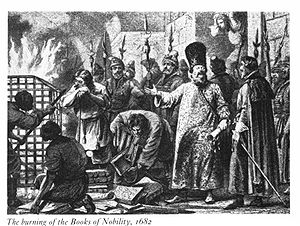- Méstnichestvo
-
 Quemando los libros de nobleza en 1682.
Quemando los libros de nobleza en 1682.
En la historia rusa, el méstnichestvo (en ruso: Мéстничество) era un sistema feudal jerárquico que funcionó desde el siglo XV al XVII. La palabra deriva del ruso "Место" (Mesto - "lugar"). Se desarrolló alrededor de un concepto: el boyardo que estimara que sus orígenes eran más antiguos y sus servicios al zar más valioso, podía reclamar un mayor cargo en el estado. Esto a menudo condujo a disputas entre los nobles sobre sus ancestros y sus servicos al monarca.
Por causa del méstnichestvo, la gente que estaba cualificada para las tareas necesitadas pero que no podía alegar una solera suficientemente extensa, no tenía esperanza de ocupar un cargo importante. Del mismo modo, un boyardo que proviniera de una familia antigua y respetada podía conseguir una importante promoción a pesar de que sus habilidades personales fueran las adecuadas para el puesto.
Con el desarrollo del absolutismo ruso, cuyo principio central era la creación de una burocracia central que informara directamente al zar de y no perdiera el tiempo compitiendo entre sí, la importancia del méstnichestvo se fue reduciendo progresivamente. Otra de las razones de su desaparición, acaecida definitivamente en 1682, fueron los crecientes intereses defensivos, que requerían que los puestos de importancia del ejército estuvieran ocupados por oficiales capacitados y no por boyardos honorables pero ineptos.
Referencias
Categoría:- Nobleza de Rusia
Wikimedia foundation. 2010.
